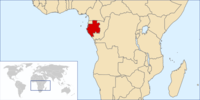Portal:Gabon
Gabon (/ɡəˈbɒn/; French pronunciation: [ɡabɔ̃]) is a country in west central Africa sharing borders with the Gulf of Guinea to the west, Equatorial Guinea to the northwest, and Cameroon to the north, with the Republic of the Congo curving around the east and south. Its size is almost 270,000 km² with an estimated population of 1,500,000. The capital and largest city is Libreville. Since its independence from France on August 17, 1960, the Republic has been ruled by three presidents. In the early 1990s, Gabon introduced a multi-party system and a new democratic constitution that allowed for a more transparent electoral process and reformed many governmental institutions. The small population density together with abundant natural resources and foreign private investment have helped make Gabon one of the most prosperous countries in the region, with the highest HDI in Sub-Saharan Africa.Lua error in package.lua at line 80: module 'Module:Box-header/colours' not found. Mountains in Gabon Lua error in package.lua at line 80: module 'Module:Box-header/colours' not found. Minkébé National Park is a national park in the extreme northeast of Gabon. It covers an area of 7,570 km². The WWF recognized it as an area needing protection as early as 1989 and has been actively working towards protecting the forest since 1997. The park was established as a provisional reserve in 2000 but the Minkébé National Park itself was officially recognized and established by the Gabonese government in August 2002. It is recognized as a critical site for conservation by the IUCN and has been proposed as a World Heritage Site. The Fang people once inhabited the Minkébé area but on becoming a protected area the park now has no permanent human population. The name Minkébé derives from the Fang word 'Minkegbe', which means 'valleys' or 'ditches'. Historically, the park was under former French army control in the 1920s. In 1997, the WWF initiated a management program and established two main centres of forest command, one at Oyem, the other at Makokou. A central camp was also installed at the mouth of the river Nouna to manage the protected area. Since 1997, the park has received funds from DGIS (Netherlands Development Cooperation) and CARPE (USAID), and the WWF has worked with other groups to build up ways in which to manage and protect the biodiversity in the park. The park has received donors from the European Union, CARPE, UNESCO and the French Global Environment Facility (FFEM). (Read more...) Lua error in package.lua at line 80: module 'Module:Box-header/colours' not found. Beach at Libreville, Gabon. Template:/box-header Template:/Did you know Template:/box-footer Template:/box-header Template:/In the news Template:/box-footer Template:/box-header Template:/Categories Template:/box-footer Template:/box-header Template:/Related portals Template:/box-footer Lua error in package.lua at line 80: module 'Module:Box-header/colours' not found. Paul Marie Indjendjet Gondjout (4 June 1912 – 1 July 1990) was a Gabonese politician and civil servant, and the father of Laure Gondjout, another prominent Gabonese politician. Gondjout was a member of the Mpongwe ethnic group, and served in the French colonial administration from 1928, and founded the Cercle amical et mutualiste des évolués de Port-Gentil in 1943. He was a delegate to the French Senate from 1949 to 1958, and founded the Gabonese Democratic Bloc (BDG). In 1954, Léon M'ba joined the party and eventually overthrew Gondjout as leader. In 1960, then President M'ba reshuffled the government without consulting Parliament. When Gondjout filed a motion of censure he was charged with attempting a coup d'état and sentenced to two years in prison. Following his release, M'ba appointed him to the largely symbolic post of President of the Economic Council, in part to silence the threat he represented. Gondjout served as Minister of State during the abortive 1964 Gabon coup d'état but was acquitted of all charges during his subsequent trial. He lived outside public view from his 1966 acquittal to his death on 1 July 1990 and there is little record of his life during this period. Template:/box-header Template:/Topics Template:/box-footer The following Wikimedia sister projects provide more on this subject:
|
|||||



